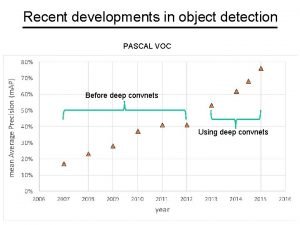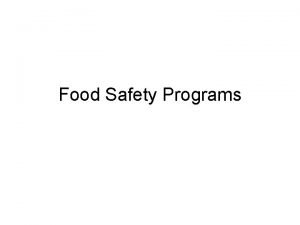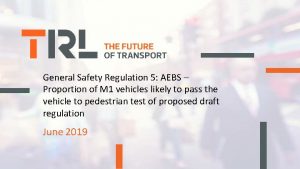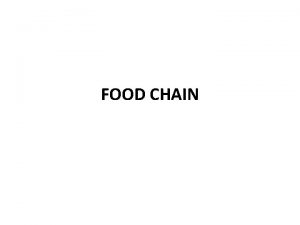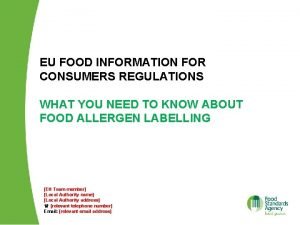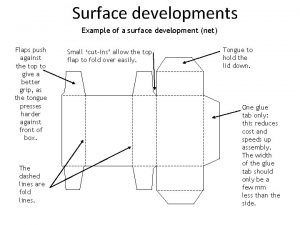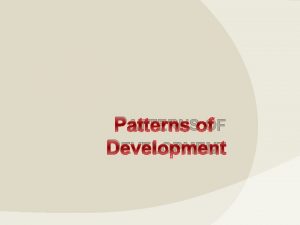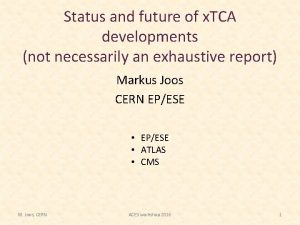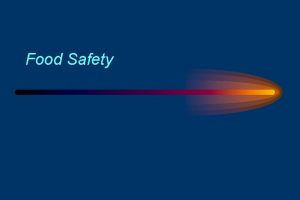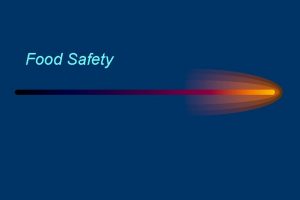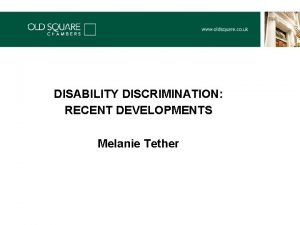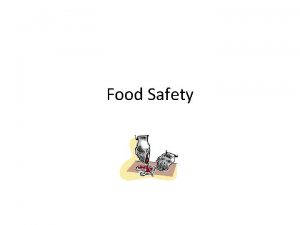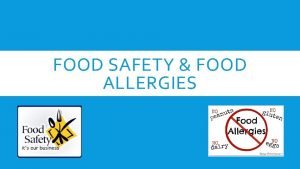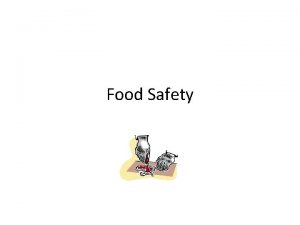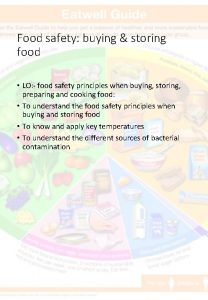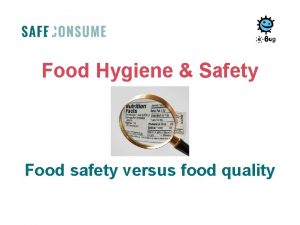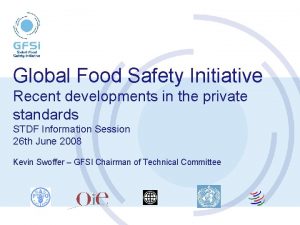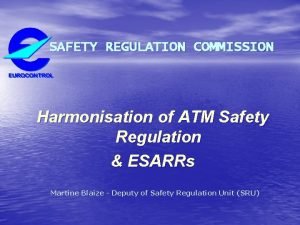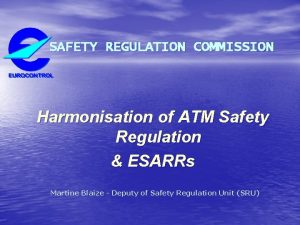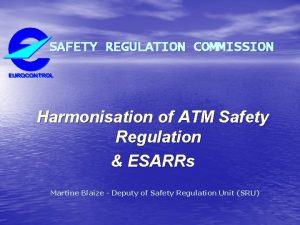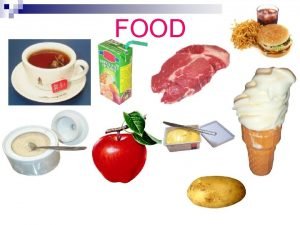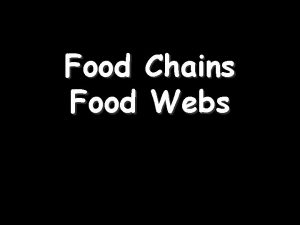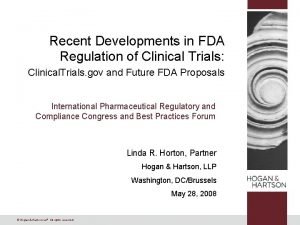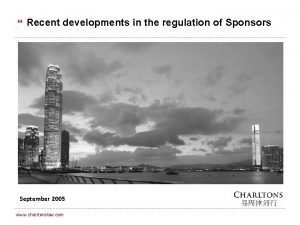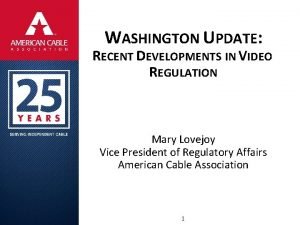Recent Developments in Regulation of Food Safety and






















- Slides: 22

Recent Developments in Regulation of Food Safety and Primary Products in Australia and New Zealand Ken Buckle Professor of Food Science and Technology Faculty of Engineering, The University of New South Wales Sydney, NSW 2052, Australia and Graham Peachey CEO, Food Standards Australia New Zealand, Canberra, ACT, Australia IUFo. ST – MIFT Symposium on Global Developments in Food Safety and Food Standards Kuala Lumpur, Malaysia, 22 -23 March 2005

Outline of Presentation • Background to FSANZ and standards development • ANZ Food Standards Code review • Current status of Food Safety Standards • Current status of Primary Production and Processing Standards • Links with international agencies • Regional training activities • Summary

Background to FSANZ • NFA formed 1991 • ANZFA formed 1995 • FSANZ formed 2002, objectives modified and policy responsibility changed • Ministers (ANZFRMC) develop policy framework, FSANZ develops appropriate food standards • Ministers requested FSANZ to take responsibility for extending risk analysis approach to good hygienic practice and

Food Standards Policy Development • ANZ Food Regulation Ministerial Council (ANZFRMC) develops policy on food standards (e. g. health claims, country of origin labelling, nutrient fortification) • Food Regulation Standing Committee (FRSC) – provides policy advice to Ministerial Council – all jurisdictions represented • Implementation Sub-Committee (ISC) – provides advice on enforcement • Technical Advisory Group (TAG)

Food Standards Australia New Zealand • Objectives – Protection of public health and safety – Provision of adequate information for consumers to make informed choices – Prevention of misleading or deceptive conduct

Food Standards Australia New Zealand FSANZ must also take account of: • risk analysis using best scientific evidence • consistency between domestic and international standards • need for efficient / competitive industry • promotion of fair trading in food • any written policy advice from Ministers

Food Standards Australia New Zealand Food standards development by FSANZ: • Applications (external) or Proposals (internal) • Three assessment reports (Initial, Draft, Final) • Two public consultations • Three Board approvals • Ministerial Council consideration / approval / review • States and Territories incorporate

FSANZ Food Standards Development INITIAL ASSESSMENT Public Consultation DRAFT ASSESSMENT Public Consultation FINAL ASSESSMENT Public Information MINISTERIAL COUNCIL

ANZ Food Standards Code • Reviewed in 1999 -2002 • Emphasis on general (horizontal) standards increased • Commodity (vertical) standards reduced • Greater emphasis on labelling and information for consumers

ANZ Food Standards Code Chapter 1 − General Food Standards Chapter 2 − Commodity Standards Chapter 3 − Food Safety Standards (Australia only) Chapter 4 − Primary Product and Processing Standards (Australia only)

Enforcement of Food Standards • Food standards developed by FSANZ • Food standards enforced by appropriate jurisdictions: Australia: • States (6), e. g. NSW Food Authority (1 st Australian through chain agency), and Territories (2) • Australian Quarantine Inspection Service (imported foods) New Zealand: • New Zealand Food Safety Authority

Food Safety Standards (Australia only) • Part 3. 1 Preliminary – Standard 3. 1. 1 Interpretation and Application • Part 3. 2 Food Safety Requirements – Standard 3. 2. 1 Food Safety Programs* – Standard 3. 2. 2 Food Safety Practices and General Requirements – Standard 3. 2. 3 Food Premises and Equipment * Standard 3. 2. 1 being developed for implementation by States and Territories

Food Safety Standard 3. 2. 1 (Australia only) • General food safety program requirements examine all food handling operations, develop FSP, write FSP, comply with FSP, conduct review of FSP at least annually • Auditing of food safety programs by food safety auditor at appropriate frequency, make document available to auditors, retain copies of reports • Content of food safety programs based on HACCP

Food Safety Standard 3. 2. 1 (Australia only) Food Safety Programs must: • Identify potential hazards • Identify where hazards can be controlled • Provide for systematic monitoring of controls • Provide for corrective action if hazard not under control • Provide for regular review of FSP • Provide for appropriate records to be

Primary Production and Processing (PPP) Standards (Australia only) PPP standards will: • apply in Australia only • focus primarily on food safety matters consistent with Chapters 2 and 3 of the Food Standards Code • deal with specific commodity groups • cover the supply chain to the extent determined by the Standard Development Committee (SDC)

PPP Standard Development Committees • Appointed by FSANZ Board • Consist of representatives from industry, government and consumers • Provide advice to FSANZ

Seafood PPP Standard • Seafood SDC appointed October 2002 • SDC has met six times • SDC comments on all aspects of standards development process (scientific evaluation, food safety management options, draft standard) • SDC acts as a communication channel to other stakeholders to improve feedback • Standard to be finalised in 2005

Links with International Agencies • Codex Alimentarius Commission – risk analysis framework – input into Committee deliberations (general, commodity) • World Trade Organization (WTO) – FSANZ staff invited to participate in SPS discussions

Regional Training Activities in Food Safety • Risk assessment / management workshops – Vietnam – China • ANZ Food Standards Code as a model for adoption (e. g. Singapore, India)

Summary • Regulatory convergence is inevitable, both regionally and internationally • FSANZ structures and processes now sufficiently flexible to cope with future developments • Food Standards Code and risk analysis procedures……. . a useful model for developing countries? ?

FSANZ Contact Details • FSANZ Australia Tel: +61 2 6271 2222 Fax: +61 2 6271 2278 Email: info@foodstandards. gov. au • FSANZ New Zealand Tel: +64 4 473 9942 Fax: +64 4 473 9855 Email: info@foodstandards. govt. nz • Website: www. foodstandards. gov. au www. foodstandards. govt. nz

Thank you! Terima kasih!
 Recent developments in ict
Recent developments in ict Recent developments in object detection
Recent developments in object detection Control measures for physical hazards
Control measures for physical hazards General safety regulation
General safety regulation General safety regulation
General safety regulation Unit 2 food food food
Unit 2 food food food Food chain sequence
Food chain sequence Eu food information for consumers regulation
Eu food information for consumers regulation Cultural development of sahelanthropus tchadensis brainly
Cultural development of sahelanthropus tchadensis brainly Peter rosenwald
Peter rosenwald Political developments in the early republic
Political developments in the early republic Huron creek developments reviews
Huron creek developments reviews Chapter 11 political developments in the early republic
Chapter 11 political developments in the early republic What is surface development
What is surface development Gte milano
Gte milano In the colonial era developments such as the new england
In the colonial era developments such as the new england Target developments
Target developments What are the 2 patterns of development in writing
What are the 2 patterns of development in writing What are the two types of pattern development
What are the two types of pattern development Comtel atca
Comtel atca Democratic developments in england
Democratic developments in england Ska developments
Ska developments Surface developments
Surface developments

